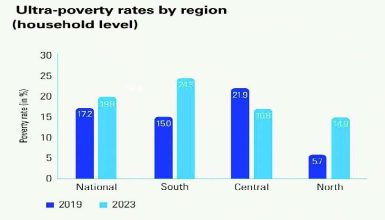RBM explains weakening financial stability
The depressed macro-economic environment, characterised by depreciation of the kwacha, high inflation and interest rates weakened the country’s financial system in the first-half of this year, Reserve Bank of Malawi (RBM) has said.
In its June 2023 Financial Stability Report, the RBM said the increase in inflationary and interest rates pressures have in turn exerted pressure on creditors’ ability to service their domestic and foreign credit obligations, thereby elevating risks to the financial sector.
The analysis, which assessed developments in the banking sector, the non-bank financial institutions, the capital market and the country’s payment system, shows that though the banking sector complied with key prudential benchmarks, it faced credit risks as non-performing loans were elevated in the period.
According to the RBM, the inflationary and interest rate pressures, coupled with the depreciation of the kwacha, have reduced the amount of disposable incomes for most households and deteriorated the levels of working capital in corporate, thereby increasing demand for credit.

Reads the report in part: “Risks to financial stability intensified in the first-half of 2023 compared to the previous half. This is largely due to persistently high inflation, high interest rates, continued depreciation of the local currency and acute foreign exchange shortages.
“Consequently, the real gross domestic product (GDP) growth rate for 2023 was revised downward to 1.9 percent from the 2.7 percent projection made in November 2022. The revision was attributed to the impact of Tropical Cyclone Freddy, which caused damage to crops and infrastructure and affected productivity in the real estate, transportation, electricity, and water sectors of the economy.”
The RBM said though the banking sector remained sound and resilient throughout the first half of 2023 as measured by capital, earnings and liquidity, the asset quality, as measured by the non-performing loans ratio deteriorated to 6.9 percent from 6.3 percent in December 2022, breaching the acceptable limit of five percent.
Similarly, the RBM indicated that the pension sector equally posted a strong and resilient performance, recording substantial growth in total assets but was hindered by high contribution arrears and exposure to inherent risks such as market, credit and inflation risks.
In terms of the stock market, the RBM data shows that though the capital market was buoyant during the first six-months—to June 2022— as seen by the increase in the Malawi all Share Index, the majority of counters experienced share price gains.
Economic statistician Alick Nyasulu observed that the performance which reflects the state of the economy which is currently fragile calls for the need for the country to address key governance failure which will exacerbate the risks further and destabilise the financial sector.
“A further deprecation of the kwacha, high inflation and interest rates if not tamed may collapse formal credit markets, and the financial system in general. This, therefore, needs a quick fix because it is an economic disaster waiting to explode,” he said.
For sectors such as insurance and micro-finance, the data shows that though the sectors were resilient, they were also vulnerable to weak liquidity and high credit risks.
Meanwhile, RBM Governor Wilson Banda, who is also the registrar of financial institutions, indicated that in line with the RBM’s mandate of financial stability, it will continue to monitor trends in systemic risk and seek to ensure that the financial system is prepared for and is resilient to the wide range of risks in the face of uncertain projections.





